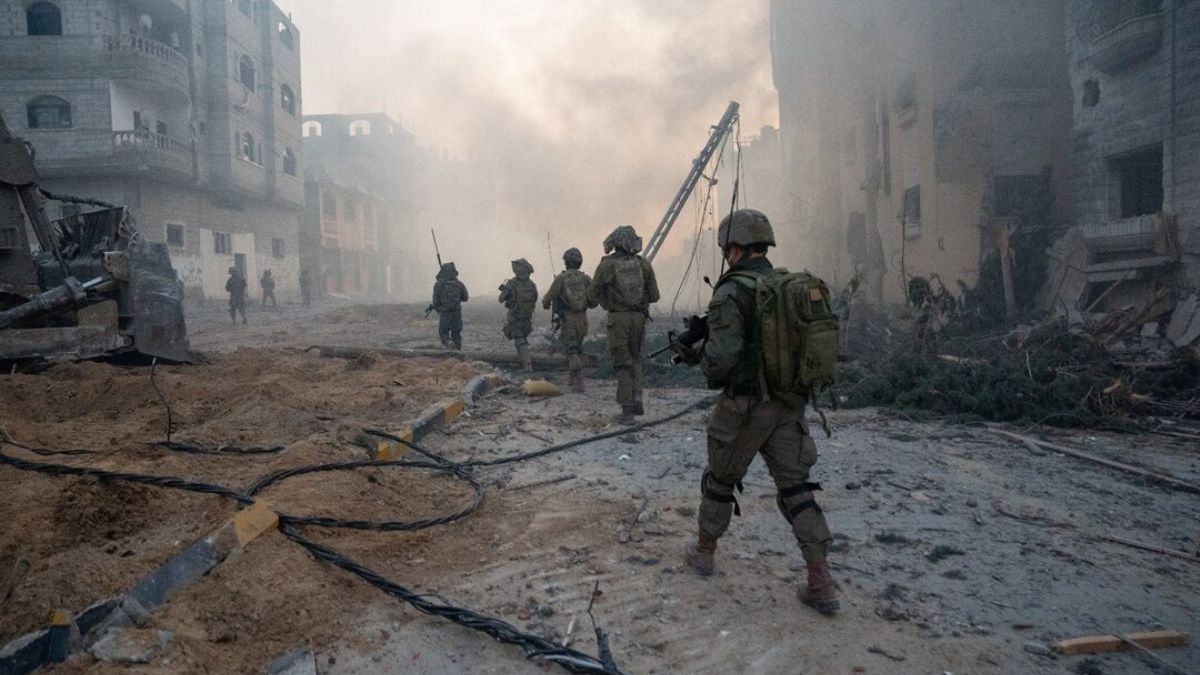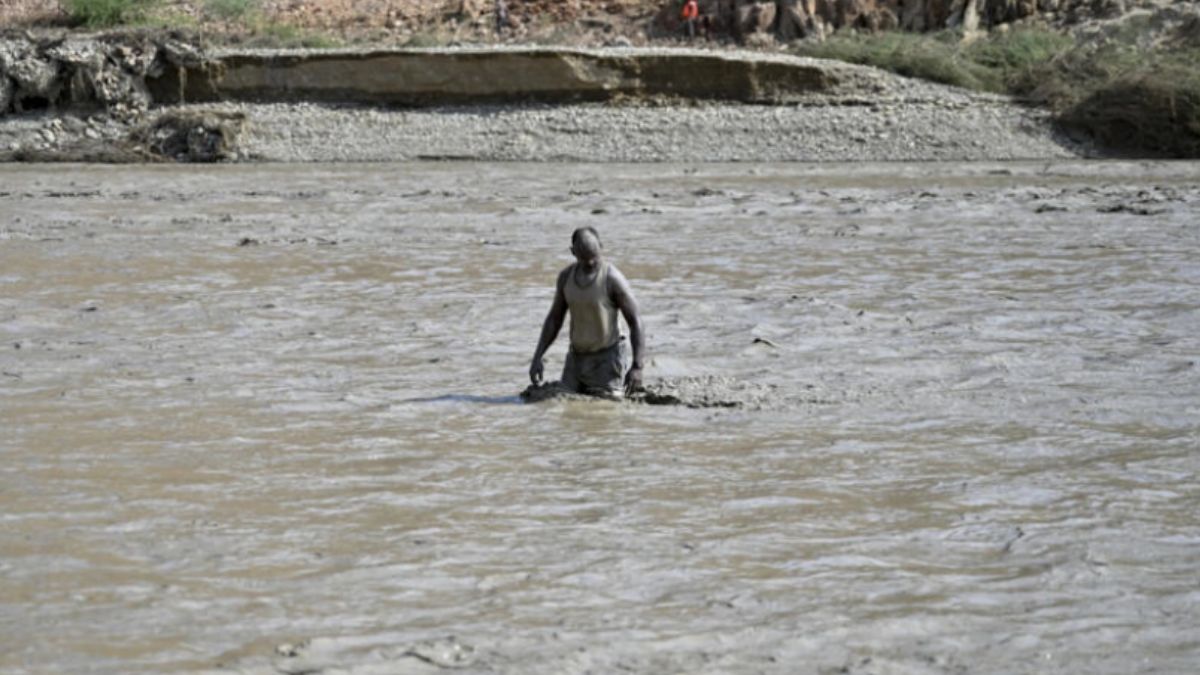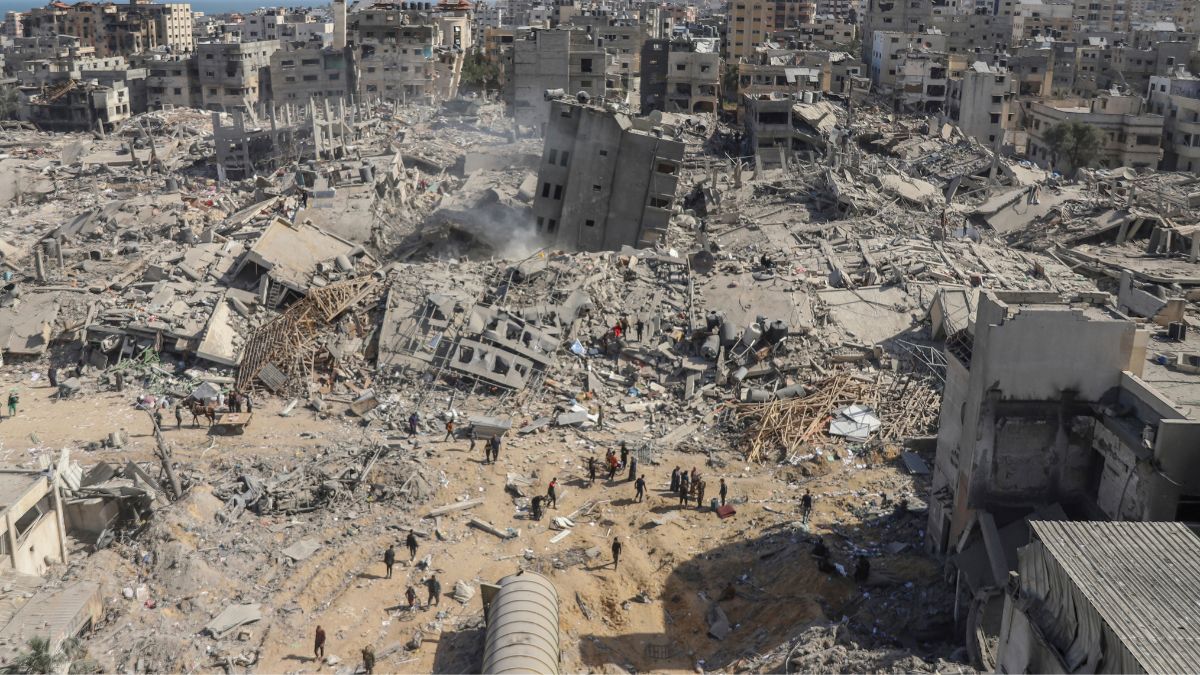With no end in sight to the war in the Gaza Strip, there are fears that it has a become a ‘forever war’ of Israel just like the war in Afghanistan was for the United States read more
)
With no end of war in sight and no day-after plan, Gaza appears to be locked in a forever war. (Representative Photo, Credit: Reuters)
A year ago, as the extent of the Hamas’ attack became known, it was feared that Israel’s response may get it embroiled in an unending regional war.
A year later, the regional war is practically here as Israel is fighting Hamas in the Gaza Strip, Hezbollah in Lebanon, and is also clashing directly with Iran.
The most intensive fighting has already shifted to Lebanon where Israel has battered Hezbollah and has taken out its leadership. The focus of ongoing diplomatic efforts is to stabilise the situation there and prevent an all-out war between Israel and Iran. The war in Gaza appears to have become a distant afterthought — just like the US war in Afghanistan after the United States invaded Iraq.
With no plan for a governance alternative for Gaza and no discussions to address the underlying Israeli-Palestinian conflict, it’s not hard to see the war in Gaza as ‘forever war’ which Israel has few ways to get out of, but Shaiel Ben-Ephraim, a US-based analyst of Israeli and Middle Eastern affairs, tells Firstpost that the war in Gaza cannot be allowed to become a forever war.
There is no way that Israel can wage the war for another year as that would put an unsustainable economic and military strain on Israel and could even trigger an exodus of educated professionals, such as those in the technology and finance sectors, who make Israel the modern nation that it is known as, says Ben-Ephraim.
Has Israel walked into a stalemate in Gaza?
Hours after the Hamas’ attack began, Netanyahu announced the war on the terrorist group. He declared war’s two objectives: the defeat of Hamas and release of hostages. Two more objectives were added later: finding and killing Sinwar and the ensuring the return of displaced Israelis to their homes in the country’s north.
A year later, all of these objectives are unfulfilled.
Ben-Ephraim tells Firstpost, “The only major achievement has so far been in killing terrorists and weakening Hamas and Hezbollah. Otherwise, Israel has not achieved any objectives it started out with. Hamas has not been removed from governance in Gaza. It continues to have the main role in the distribution of humanitarian aid. It continues to have policing and taxation roles. Practically, it retains control of Gaza even as its military infrastructure has been battered.”
On the other side, Sinwar started the war with the following objectives: the revival of the Palestinian cause, uniting all fronts from Gaza to Lebanon and Iran in one war, weakening the Palestinian Authority (PA) to become the main Palestinian player, and eroding Israel’s support. He has managed to fulfil these objectives so far.
The refusal to come up with any plan for the day after the war ends in Gaza and the refusal to address the question of Palestinian statehood leaves Israel in a situation where military successes are at a risk of going to a waste.
“It’s incredible that Sinwar is close to achieving his objectives despite Israel eviscerating his forces in Gaza. But as Israel has not acted politically on these battlefield victories and they have not held onto Gazan territories to govern or let someone else govern, they have a situation where Hamas is still there in Gaza despite suffering military defeats. Keeping the Palestinian Authority (PA) marginalised from governing Palestinians weakens PA and the more PA weakens, the stronger Hamas gets politically. The situation is such that even with military gains, Israel is staring at a political stalemate,” says Ben-Ephraim.
As things stand, there is simply no political solution for Gaza on the table. Even in the best-case scenario in which Hamas is militarily dismantled and Sinwar is captured or killed, the lack of a day-after plan means that either Gaza comes under Israeli occupation or is left for the remnants of Hamas.
Whatever Netanyahu may say about the PA, comparing PA’s Fatah to Hamas or ruling out its role in Gaza, the fact remains that it is the only internationally-recognised Palestinian government and a reformed PA is the best bet to run Gaza, says Alvite Ningthoujam, a scholar of the Israeli and Middle Eastern affairs at the Symbiosis School of International Studies (SIS) at Symbiosis International University (SIU), Pune.
Other proposals for Gaza may include a consortium of Arab nations, such as the UAE or Egypt, but that negates the whole premise of Palestinian self-determination and creating a pathway for eventual statehood.
“Following the October 7 attack, the issue of the Palestinians came to the fore again, which had faded into background for a long time. Hamas has taken credit as bringing the issue to the fore again. Hamas has projected itself as the real representative of the Palestinians. But Israel does not engage politically with Hamas and does not want it to govern Gaza. At the same time, it does not want PA to run Gaza either. Moreover, it is not coming up with any governance plan as well. So, where does that leave us? A reformed PA is the best bet in Gaza, but, as Israel continues to marginalise PA, there appears to be no political solution in sight,” says Ningthoujam, an Assistant Professor at SIS.
Israel finally comes up with a plan — or does it?
Even though Israel has not come up with any day-after plan for Gaza, for the first time since the war began, there appears to be a narrow way for the end of the war.
Throughout last month, i n a series of stunning intelligence and military successes, Israel took down the emergency communication system of Hezbollah in Lebanon and then eliminated the entire leadership along with a large chunk of its war-waging capabilities. Then, this month, Israel ordered evacuations in northern Gaza and launched a military operation that appears to be like a siege with the idea of either forcing remnants of Hamas out of their tunnels or imposing starvation on them.
The strategy is based on what has been termed ‘Eiland Plan’ after Giora Eiland, a retired Israeli general, who floated it. Under the plan, the siege will remain until the last Hamas terrorist surrenders or starves to death.
Ben-Ephraim tells Firstpost, “For the first time, Netanyahu appears to have some kind of a strategy to end the war. Once the civilians leave, the military is expected to lay siege to major cities in Gaza where Hamas has rebuilt itself. The siege is being coordinated with the push against Hezbollah in Lebanon. The siege is expected to last three weeks. The idea is to bring them to the negotiating table for a hostage deal with some leverage for Israel. Any military success in the siege will have to be matched by appropriate political moves to get any real benefit.”
The usage of starvation as an instrument of war in a battlefield that has already reported starvation from the war-induced humanitarian catastrophe is not something that will win Israel friends — particularly when it’s on trial for war crimes and crimes against humanity. Nadav Tamir, the Executive Director of advocacy group J Street Israel, noted that Israel has only used force in the war so far and the Eiland Plan is another such plan that favours force over diplomacy and is not workable.
In an article for The Jerusalem Post, Tamir said that Netanyahu has so far avoided any non-militaristic solution as that could mean the end of his term as premier.
“Wars that are managed wisely and with a strategic purpose can create a basis for agreements, but it is diplomacy that turns military advantage into strategic success in the political arena. In Israel, diplomacy garners lower ratings than the lust for war, starvation, and the unhinged desire for ’total victory’, which can never be achieved. For an entire year, the State of Israel under Prime Minister Benjamin Netanyahu’s government has been implementing a policy of using force, without any use of diplomacy, simply because any attempt at a non-militaristic solution could mean the end of Netanyahu’s coalition,” noted Tamir.
Even if plan works, the core issue remains unaddressed
Even if the coordinated military campaign against Hamas and Hezbollah works out to end the war on Israel’s terms, the core issue of the Israeli-Palestinian conflict would still remain unaddressed. In the absence of any real dialogue between the Israelis and Palestinians, it’s just a matter of time that tensions erupt again.
Even though Hamas brought the question of the Palestinians to the fore again with the October 7 attack, no real dialogue for the resolution of the conflict has started and dialogue has practically been deadlocked for a long time now with no efforts for its revival, says Ningthoujam, the scholar of the Israeli and Middle Eastern affairs at the Symbiosis School of International Studies (SIS).
“There has been no real movement since the 1990s towards an Israeli-Palestinian reconciliation and the realisation of a two-state solution. The Palestinians’ proposed right to return, the issue of Jerusalem as the capital, and the border demarcation are longstanding sticking points. Then, in recent years, as far-right has risen dramatically in Israel, the expansion of settlements and increasing violence by settlers in the West Bank against Palestinians add to the issues. There cannot be any meaningful peace until the underlying conflict is addressed and there appears to be no way for it to happen in near-future,” says Ningthoujam.
Ben-Ephraim says that the resolution of the conflict needs willpower from Israel and the PA.
“Both Israelis and Palestinians have to acknowledge that the other side is going nowhere, and they are there to stay. Israel has to acknowledge PA and stop weakening it. We are in a paradox as Israel does not engage with Palestinians politically as they take up terrorist ways to make their point and as they take up terrorist ways, Israel does not engage politically and instead responds militarily. This needs to be addressed through dialogue which we have not seen for nearly a generation now. Ironically,” says Ben-Ephraim.
Madhur Sharma is a senior sub-editor at Firstpost. He primarily covers international affairs and India's foreign policy. He is a habitual reader, occasional book reviewer, and an aspiring tea connoisseur. You can follow him at @madhur_mrt on X (formerly Twitter) and you can reach out to him at [email protected] for tips, feedback, or Netflix recommendations see more

 1 month ago
9
1 month ago
9
)
)
)
)
)
)
)
)
)
)
)
)
)
)
)
)
)
)
)
)
)
)
)
)
)
 English (US) ·
English (US) ·